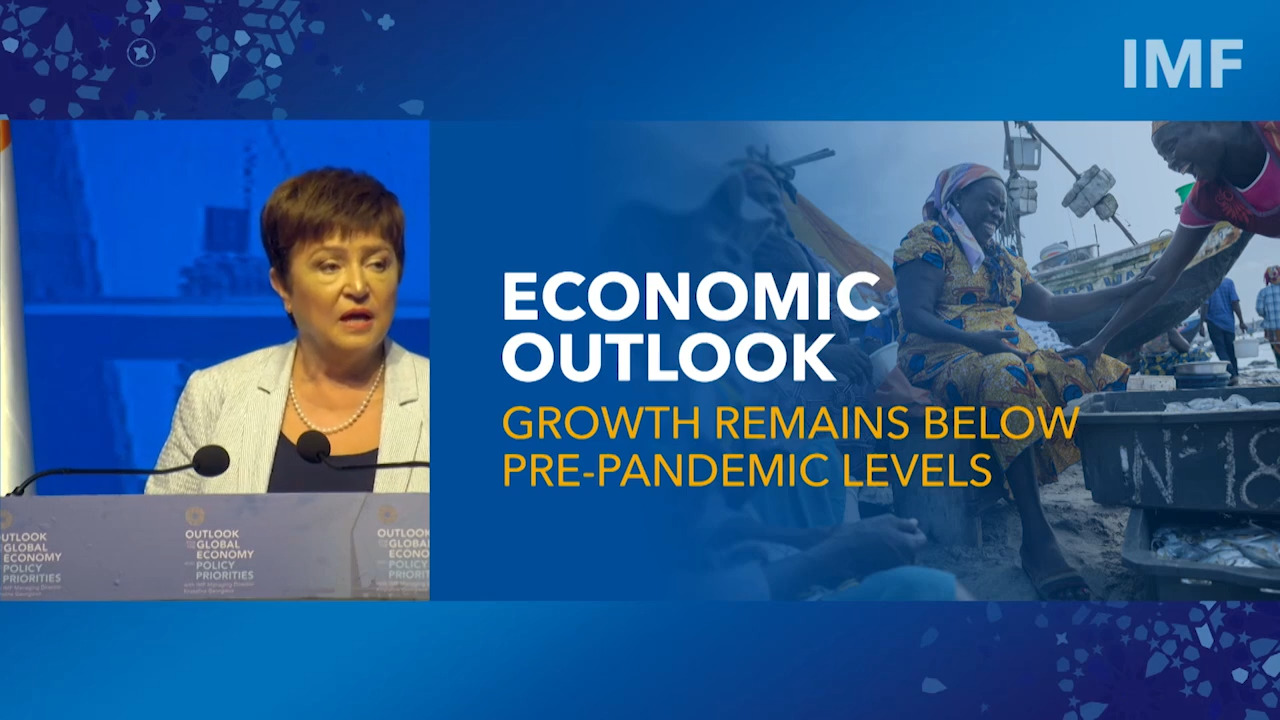2023 Annual Meetings Curtain Raiser Speech

As prepared for delivery
Your Excellency, Monsieur le Président Alassane Ouattara,
Monsieur Adama Coulibaly,
Ministers,
Members of Parliament,
Members of the diplomatic community,
Leaders of international organizations,
Honorable guests,
Mesdames et messieurs, good afternoon and thank you for your warm welcome here in Abidjan.
Earlier today, I had the opportunity to cross the beautiful Alassane Ouattara Bridge. This new transport connection is not just critical for this city. It symbolizes the transformation of Côte D’Ivoire—from a conflict-affected and fragile economy more than a decade ago to one of the fastest-growing economies in Africa. We need this spirit of optimism everywhere!
I am here because of another important connection—between Africa and the IMF.
Next week our Annual Meetings will be held in Marrakech, bringing together finance ministers and central bank governors from 190 countries. They will mark an important anniversary: half a century since the Meetings were last held in Africa—in Nairobi in 1973. Just weeks after a terrible earthquake, Morocco will bring the international community together in a spirit of solidarity and commitment to overcome the challenges we face. I want to express my heartfelt sympathy to the Moroccan people and my gratitude for generously hosting our meetings.
In the fifty years since our last meetings in Africa, the world has transformed in so many ways—life expectancy is up, globally poverty has declined, the international monetary system has adapted to a flexible exchange-rate regime, and technology has transformed the way we work, entertain and communicate. But inequalities within and across countries have increased and we are facing an existential climate crisis. And growth has been on a declining path over the last decade.
This demands actions to pave the way to the next 50 years. Our goal must be to build bridges to strong future growth that is both sustainable and inclusive.
This will be the focus of my remarks today. Being here, in Abidjan, on African soil, I take inspiration from Africa. On this continent we can see, as under a magnifying glass, the challenges facing the world. But we also see its great potential. Africa has abundant resources, and boundless creativity and energy. And it is home to the world’s youngest and fastest-growing population.
To put it simply, a prosperous world economy in the 21st century requires a prosperous Africa. Advanced economies are rapidly ageing, but they have abundant capital. The key will be to better connect that capital to Africa’s abundant human resources—to inject more dynamism into the current anemic global growth outlook.
Africa also makes the strongest case for building economic resilience. The COVID-19 pandemic, Russia’s war in Ukraine, climate disasters, the cost-of-living crisis, political instability: these are the many faces of a shock-prone world. Their impact is most fully on display in Africa, as is the overwhelming necessity to better prepare ourselves for that world.
And a prosperous Africa requires maintaining the most important bridge of all, the bridge that connects all countries—that of international cooperation.
As people in Abidjan would say: “On est ensemble”—“We are together”. During the meetings we will make coming together meaningful for the people in our member countries.
Global Outlook: The Economy Is Resilient, But Challenged By Weak Growth and Deepening Divergence
Let us start with the economic outlook. The world economy has shown remarkable resilience, and the first half of 2023 has brought some good news, largely because of stronger-than-expected demand for services and tangible progress in the fight against inflation.
This increases the chances for a soft landing for the global economy. But we can’t let our guard down.
While the recovery from the shocks of the past few years continues, it is slow and uneven. As you will see from our updated forecast next week, the current pace of global growth remains quite weak, well below the 3.8 percent average in the two decades before the pandemic. And looking ahead over the medium term, growth prospects have weakened further.

